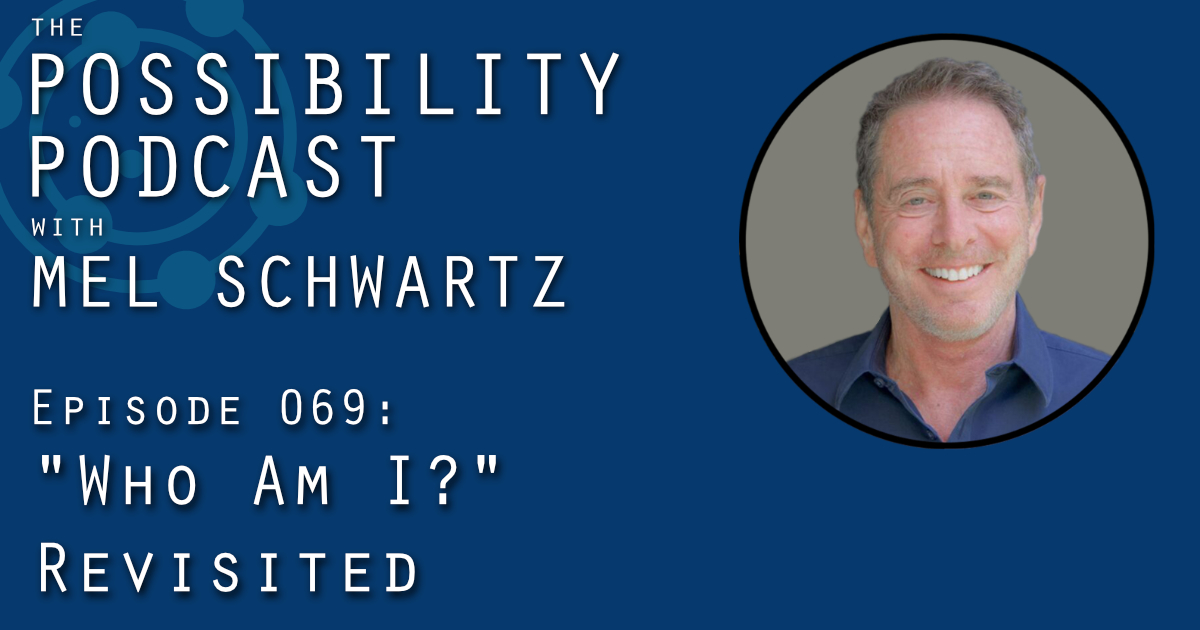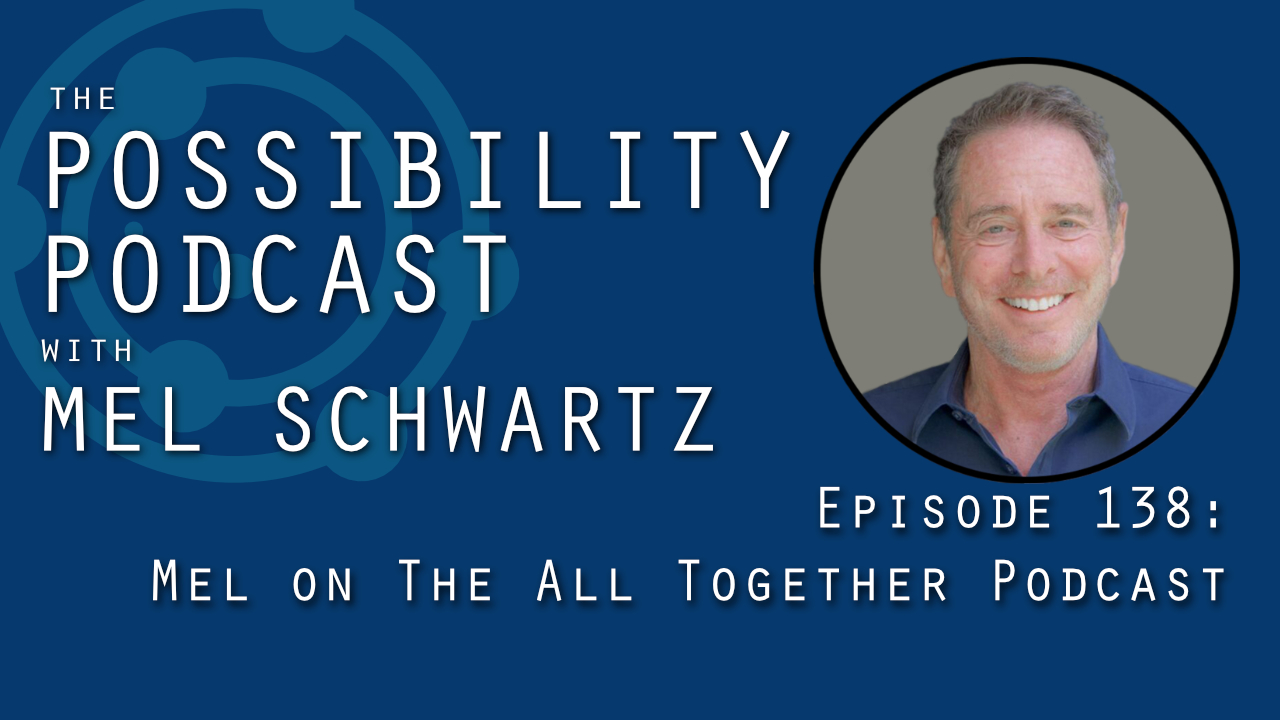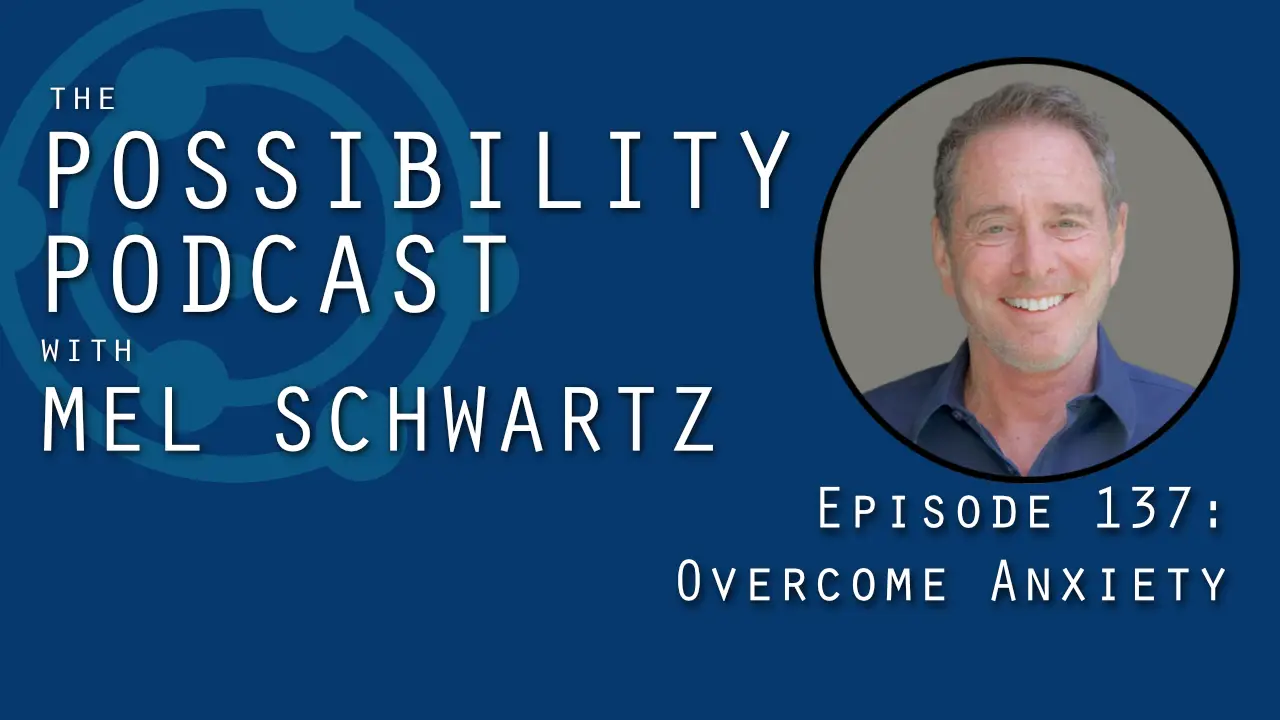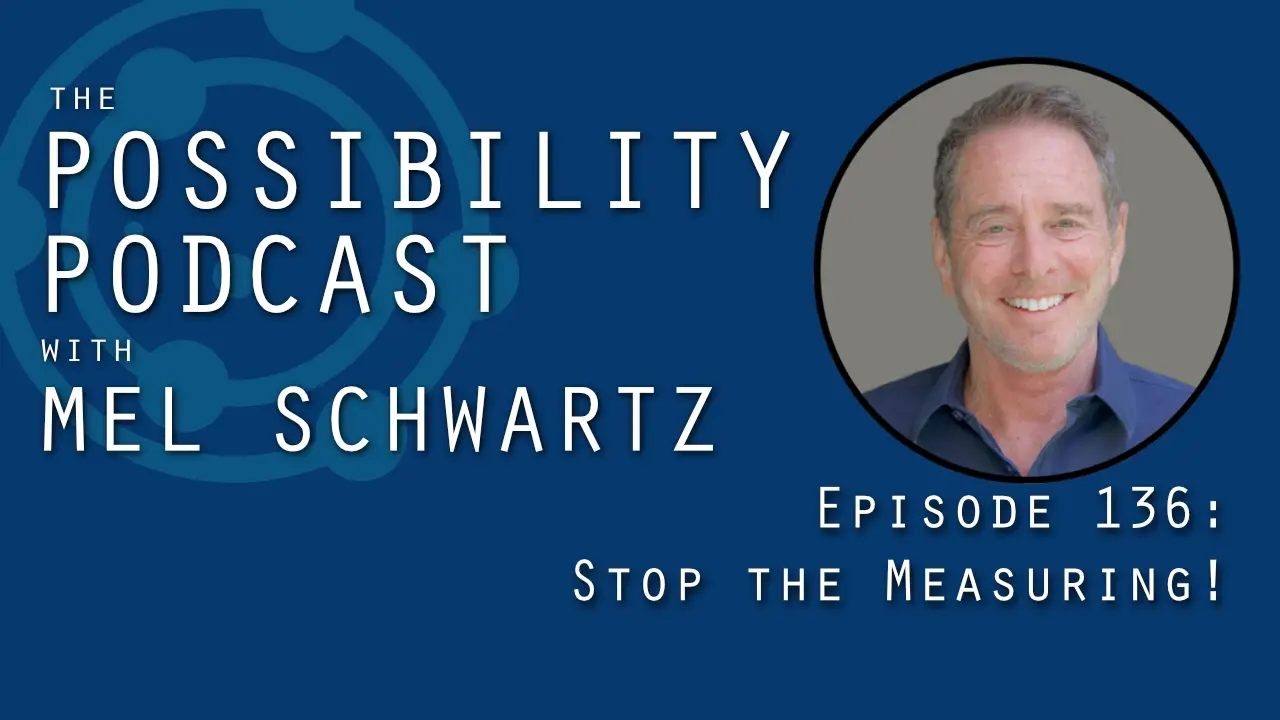Podcast: Play in new window | Download
Subscribe: RSS
Some years ago, I wrote an article called “Who Am I?” that turned out to be perhaps my most resonant piece. Episode 069 of The Possibility Podcast with Mel Schwartz is an opportunity to revisit the topic… and my answer to the question everyone asks just might surprise you.
Listen to learn…
Interested in bespoke marriage and relationship counseling from Mel Schwartz? Reach out!
- …why questions with fixed answers reflect a stagnant mindset
- …the healthy reason our identities change over time
- …how quantum physics defines reality as ever-changing and in flux
- …why embracing uncertainty enables an aspirational life
- …why those who say they know themselves… might have more to learn
Is it time to revisit who you are? Let me know in the comments!
Want to watch this episode?
Transcript of The Possibility Podcast with Mel Schwartz #069
Hi, and welcome to today’s episode. The topic, or the title for today’s inquiry, is simply, “Who Am I?” This is a question that probably most people ask themselves at least once, but more likely far more than once, at some point in your life. Or many times in your life.
I wrote an article called “Who Am I” maybe fifteen years ago. After a number of years, I Googled it. It was receiving an enormous amount of views. I had posted it on my website and on Psychology Today, and I found that over time, this article, this had close to one million views, or maybe over a million.
Now, this is not because of my being a renowned brilliant author. It is because this question is on people’s minds, they Google it, and it brings them to my article.
So. Let me move into sharing my insights and perspectives around this question and what it does.
Firstly, the question “who am I” suggests that there’s actually a fixed specific and inert answer. “Who am I? I am so-and-so, such-and-such.” Fixed. Unmoving. Unchanging. If our identity is unchanging, boy, wouldn’t that get boring and dull? If my sense of self, who am I, is always the same through adolescence and early adulthood and middle age and old age, who am I” should remain fixed? That makes no sense.
But the description, the answer to the question “who am I,” prompts a fixed, unchanging answer. Now that sense of being fixed and unchanging is inconsistent with reality, with the universe, how reality appears. We have seen that reality is ever-flowing. Always moving, evolving, shifting, creating, dynamic. How can we leave ourselves out of that mix. If we do, under the illusion that we are fixed and unchanging, wouldn’t we stagnate? Wouldn’t we become depressed? Even if the sense of “who am I” is positive, don’t we want some change? Do we always want to know of ourselves in the same way?
So I propose “who am I” is the wrong question. The question we should ask ourselves is, “How would I like to experience myself? How would I like to experience my life, my relationships, my engagements with reality and the universe. How would I like to experience it all?”
Now that question is non-specific, it’s not inert, it’s flowing, it’s moving, and it could and should be aspirational. So just picture that. Don’t ask “who am I.” Ask, “How would I like to experience myself?”
This shifts you from a stuck being, a human being fixed and stuck in your identity, inert, into a human becoming: flow, movement, becoming. Don’t you want to engage in a sense of becoming?
Part of me is fundamentally who I used to be, but this is evolved, new insights have happened, I’ve made advances and progress in this way or that way, I used to be insecure about this but I no longer am; my sense of self is evolving, that’s a deeper engagement in life.
So rather than taking a frozen and fixed shapshot of yourself and answering “who am I,” think about recrafting, rethinking, developing an artistry to yourself where you keep what works and what feels good and authentic and genuine, and the pieces of you that you know are growing old and tired, like old coping mechanisms that no longer suit you decades later and old coping mechanism which was at first adaptive many years before becomes like a suit of armor that you clank around with. Is that how you want to be fixed?
No, you want to move into this flowing sense of becoming.
This process of becoming, it allows us to move beyond this confinement this narrow sense of self. It ushers in our change process.
Now this is the big picture. I’m going to get to the smaller more minute details in just a bit — but this sense of becoming, of entering into the flow of life, it lies at the heart of what I call the possibility principle, which is the theme in my book, The Possibility Principle. Simply: if by embracing uncertainty rather than in resisting it, we bring in new possibilities into our life and we become a work of art. We become both the artist and the work of art.
That makes life full of meaning and purpose and vitality. There’s a sense of why I’m here: to recraft myself to develop and grow and always hone. Now I don’t mean being judgmental about yourself or being overly analytical. I’m talking about a softer touch here. A an inspirational nurturing, parenting of your own self so to speak.
Now there are people who will say they know themselves so well. I feel sad for people who say that. That means they leaves no room for growth or aspiration, and when someone says I know myself so well, that speaks to a lack of curiosity and ultimately it suggests that there’s some insecurity there.
Who can know themselves so well? The more you seek to discover and unfold the possibilities that lie within you, the more you look toward the aspirations of the future, not a repeat of the past of knowing yourself so well. That’s like reading the same book forty six times. The same book! How’s that going to work out? Think of reaching into your future and beginning to imagine and envision how you would like to experience yourself, how you would like to experience your friends, you parents, your children… how you would like to experience your life and your life engagement.
Now. How do we get there? Well, let’s ask ourselves this: What informs my sense of myself? Well, starting with — think of a triangle — I wish I had some drawing utensils here but, the triangle: up at the top of the triangle are our beliefs. Major, fundamental source of how we come to know ourselves. So consider your operating beliefs: ask yourself which beliefs serve me, which beliefs help me navigate life in a healthy way, in a productive way, and in a fearless way. And then ask yourself which beliefs limit me. Which beliefs confine me. Which beliefs lull me to sleep as I repeat to myself and to others the same old messaging.
How did I come to these beliefs? What makes me think these beliefs are true? Or, what even makes me think these beliefs are serving me? A belief is just that: it’s a belief. But it is fundamentally important. It is so powerful in shaping our sense of self and how we experience life.
Now, out of these core beliefs, we have millions of thoughts which corollate to those beliefs. I don’t mean millions of different thoughts, I mean we have millions of thoughts, but some of them, the majority of them, conform to the operating beliefs. So we get stuck in this funnel, this trap: belief and thought.
Now, the moment we have a thought, the thought summons up the accompanying feeling. So we get stuck in this equation of belief, thought, feeling. Now you know where that leads to? Experience.
So if I have a belief that I’m not good enough: you think that’ll be a self-fulfilling prophesy and I may go through life experiencing that self- you can’t call it self-affirming, that self-negating belief? “I’m not good enough.”
Contrarily, suppose you have a belief of “I can do it, I deserve the chance, I’m gonna try, I bet I’ll succeed.” Do you think that belief will create a different experience? If you have a belief that it’s a miserable, competitive, cruel, dog-eat-dog universe, you’ll experience life as such. If you have a belief that humans are potentially good and loving, and you are well, and that’s what you aspire to reach, you think your life experience will be different? Beliefs, thoughts, feelings, and experiences all create a circular feedback loop. If you’d like to experience yourself differently, if you’d like to be the architect of your own life experience, so to speak, you need to envision how you’d like to experience your life, and think about the aspects of yourself that you want to open up for change, and growth, and evolving.
Then, look back at your core beliefs and recurring thoughts that get in the way and say, “Ah, I need to see those beliefs and thoughts, and release them.” You then become an agent of your own change process.
Now. Key fundamental that I’m repeating: Embracing uncertainty enables us to join in the flow of the universe. This is not mystical language. Science confirms reality, in the universe, is in perpetual flow. Shouldn’t we join in that flow? Shouldn’t we move and aspire to become this experience of a human becoming instead of a fixed, stuck person?
All of reality is perpetually flowing and participating in the reality-making process. We can do the same. We can be the author of our own reality-making process once we being to stop asking “who am I” and think of identity as an evolving growing, emergent kind of quality, and you are that quality as well, you’ll experience life on an entirely different level.
Well thanks for listening in, thanks for watching; I hope you enjoyed today’s episode, there will always be more to come on this theme and similar ones, and as always, until next time, be well, and be becoming… ‘bye for now.
Subscribe to The Possibility Podcast with Mel Schwartz
Don’t miss a single Possibility Podcast with Mel Schwartz! Subscribe for free in iTunes / Apple Podcasts, Spotify, RadioPublic, Spreaker, or wherever you listen to podcasts. Or, simply copy / paste the RSS link directly into the podcast app of your choice!
Please Rate and Review
If you enjoy The Possibility Podcast with Mel Schwartz, please take a moment to rate and review the show in iTunes / Apple Podcasts or Podchaser. It only takes a few minutes, and adding your review is as easy as clicking this link.
Your rating and review helps raise the visibility of The Possibility Podcast with Mel Schwartz, especially on iTunes / Apple Podcasts, which is one of the biggest podcasting platforms today. More visibility for the show means more listeners… and that growth means the show reaches — and helps — more people like you.
Thank you!
Talk With Mel!
Help others when Mel helps you: Contact Mel and find out how you can be a caller on the show and ask Mel a question. He’ll put the Possibility Principle to work for you, and your conversation will be recorded for use in a future episode of the podcast so other listeners can benefit.




